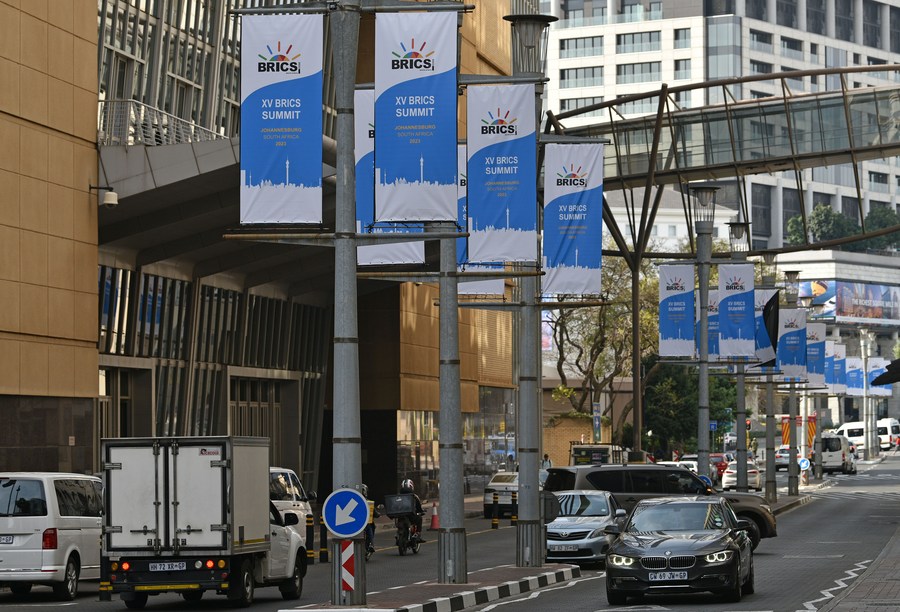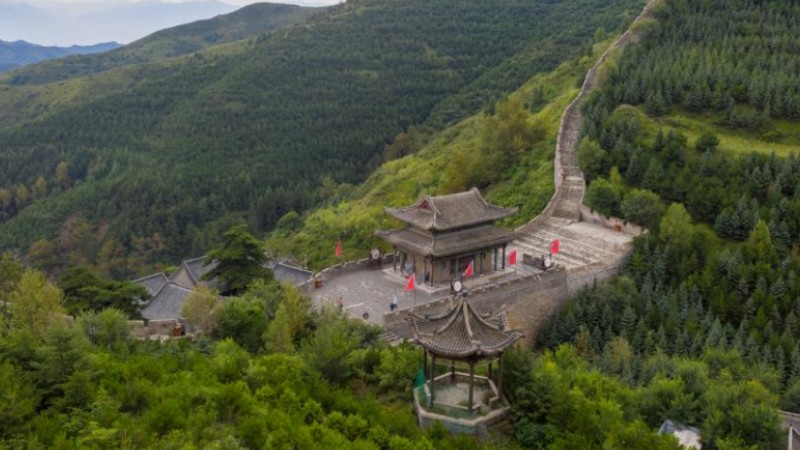Meeting of BRICS seen as watershed moment

Signboards of the 15th BRICS summit are seen on a street of Johannesburg, South Africa, Aug 17, 2023. [Photo/Xinhua]
The recently concluded 15th BRICS Summit in Johannesburg, South Africa, at which the major representatives of the developing Global South laid out guidelines for how mankind must move forward, has to be considered a watershed moment.
It was decided at the summit that BRICS — the grouping of the major emerging economies of Brazil, Russia, India, China and South Africa — will expand with the addition of Argentina, Egypt, Ethiopia, Iran, Saudi Arabia and the United Arab Emirates.
With the addition of the new members taking effect on Jan 1, BRICS will represent nearly 30 percent of world GDP and 47 percent of the global population.
In addition, there are numerous other countries interested in joining BRICS. This means that the group has become the major voice of the Global South, which represents, in terms of population, the global majority. Traditional associations like the Group of Seven will no longer have the major say in determining the course of history.
The vision of BRICS is quite different from those of the G7, NATO and other associations of the Global North.
First, BRICS has asserted the right of every country to develop. While development has been discussed for years by members of the G7, there has never been a concerted effort to pursue this in the case of the countries of the developing world. In many respects, the post-World War II world order has been less than useless in bringing the poor countries of the Global South into conditions of prosperity. In a sense, the game has been rigged to the advantage of the New York-London financial system, which effectively determined global policy.
Second, BRICS is geared toward cooperation and harmony rather than conflict and division.
The developing countries have for a long time called for major steps to bring their interests to bear. In 1976, the call for a "new and just world order" was taken up by the developing countries at the United Nations. But the developing world did not then have the political clout to carry this through, and the refusal by the Western nations to change the rules of the game prevented any major shift in resolving the dilemmas facing the Global South.
The major change in this respect has been the rise of China, from the depths of poverty to relative prosperity, and its transformation into the major engine of global growth. Moreover, the absolute determination of the Chinese government to leave no one behind in its successful, unprecedented campaign to eliminate absolute poverty in the country set a new model for other countries to follow.
China's launch in 2013 of the Belt and Road Initiative, the biggest infrastructure investment project in the world, was the helping hand other countries needed to break through the institutional barriers to major infrastructure investment set up by the major international financial institutions. China's investment in Africa, in particular, has created a new sense of optimism on the continent.
The nation's trade with African countries has grown tremendously over the past 20 years, and many of the nations have already signed Belt and Road memorandums of understanding.
China has also been a strong supporter of greater African integration. Transportation infrastructure, in which China has proved its expertise, can greatly assist in bringing about such integration.
Furthermore, while Chinese investment focuses exclusively on the physical economy of the recipient countries in coordination with those countries' own development agendas, it increases the production and the productivity of these countries, avoiding any so-called "debt trap".
Speaking at the China-Africa Leaders' Dialogue following the recent BRICS Summit, President Xi Jinping made China's focus crystal clear. "Advancing modernization through integration is the independent choice made by African countries and people. On this path to modernization, China has all along been a firm supporter, and walking side by side with Africa," Xi said.
At the forum, Xi announced three new programs through which China will support African modernization. One focuses on bolstering help for Africa's industrialization, the second will support the development of agricultural technology in Africa, and the third will focus on educating the growing population of young Africans so they can become productive members in an ever more innovative world.
The BRICS Summit also called for increasing multilateralism, and support was expressed by African nations for three other China-proposed initiatives — the Global Development Initiative, the Global Security Initiative and the Global Civilization Initiative. Together they provide a new paradigm for international relations based on harmony and win-win cooperation.
Even more significant was the mandate the BRICS leaders gave to their finance ministers to explore the use of local currencies in their transactions in order to move away from the US dollar as a reserve currency, and to create a reserve currency that, unlike the dollar, would be independent of political manipulation.
The handwriting is on the wall, and for the countries of the Global South to pursue a steady course of economic development, they must remain strong against future attempts by Western nations to disrupt BRICS solidarity.
The author is Washington correspondent for EIR News Service and a nonresident fellow at Renmin University of China's Chongyang Institute for Financial Studies.
Photos
Related Stories
- Interview: BRICS' expansion helps ensure fairer world -- former Ethiopian diplomat
- Egypt sets up gov't unit to facilitate cooperation with BRICS countries
- BRICS Summit: Powering multilateral progress
- New BRICS members seek development opportunities, fairer world order
- Bigger BRICS "stronger and more important," says Brazil's Lula
- BRICS to play bigger role in improving global governance
- BRICS stands for a fairer world, says UK expert
- BRICS challenges Western hegemony with strategic expansion
- Highlights of Xi's trip to South Africa
- BRICS can redress global imbalances -- experts
Copyright © 2023 People's Daily Online. All Rights Reserved.









